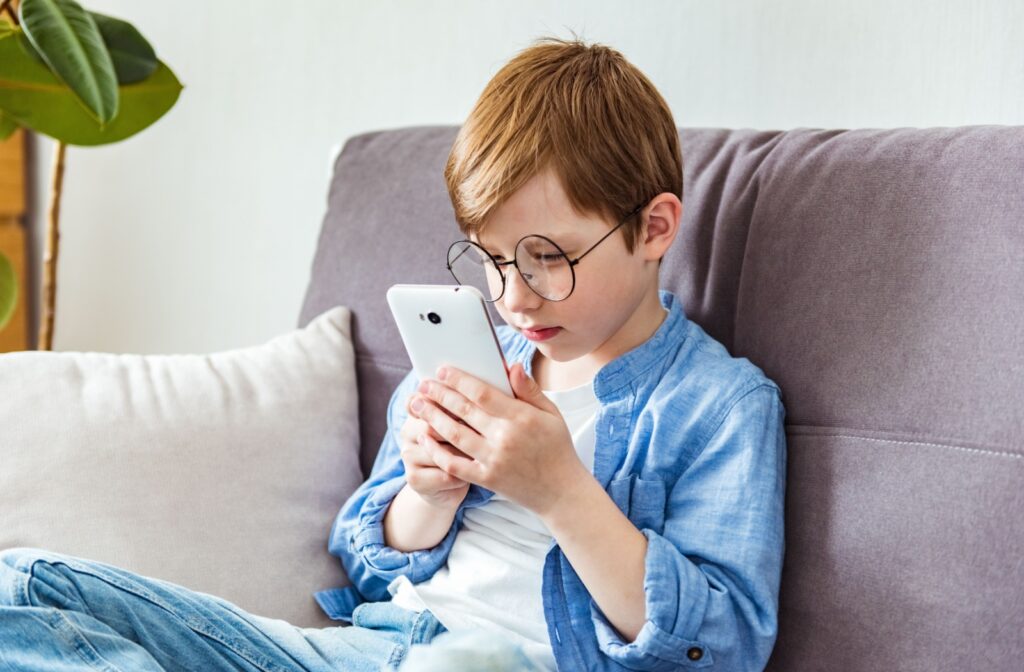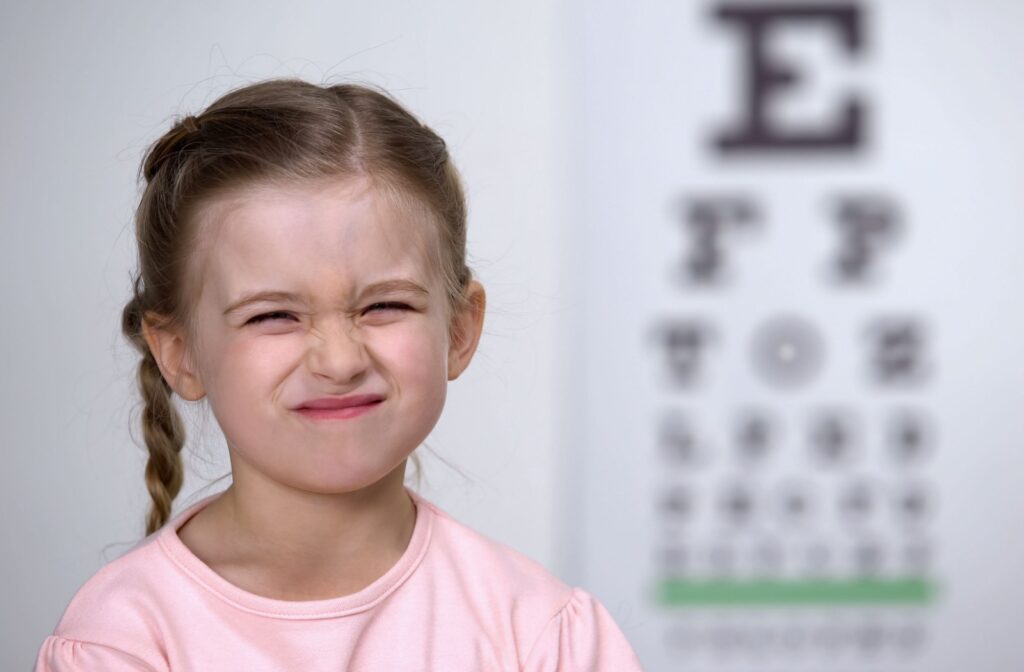Myopia, also known as nearsightedness, often starts in childhood. It tends to get progressively worse as a child grows up. Many parents wonder if there are ways to prevent myopia altogether or, if it’s already present, to reverse the condition.
While there’s no cure for myopia, and while it’s not reversible, there are ways to slow its development in children. Myopia control options include:
- Specially designed eyewear
- Orthokeratology
- Atropine eye drops
- Soft Contact Lenses
If you’re wondering whether your child has myopia, schedule a comprehensive eye exam. If your child has already been diagnosed with myopia, talk to your optometrist about treatment options.
What Is Myopia?
Myopia is also known as nearsightedness. People who are nearsighted have difficulty seeing things that are far away. Distant objects look blurry, while near objects look clear.
The retina is a tissue at the back of the eye that converts light into electrical impulses, which are then interpreted by the brain. In people with myopia, the shape of the eye causes light to focus in front of the retina rather than directly onto it. This happens when the eye is too long or the cornea or the cornea or lens are irregularly shaped.
Myopia is common. It’s estimated that 40% of the U.S. population has it. Many people can manage their myopia with eyeglasses, contact lenses, or laser surgery. The condition often starts between the ages of 6 and 14 and gradually gets worse until a person’s early twenties. Some people with pathologic myopia (a severe form of nearsightedness) may be at increased risk of eye diseases.
Myopia Symptoms
A child with myopia may:
- Squint a lot
- Sit very close to television screens or whiteboards
- Hold things very close to their face
- Blink and rub their eyes often
- Complain about headaches
Because young children can’t always articulate what’s going on with their vision, they should get regular comprehensive eye exams to detect potential problems like myopia. The American Optometric Association recommends the following eye exam frequencies for young people:
- First eye exam between 6 and 12 months of age
- At least one eye exam between the ages of 3 and 5
- An exam before first grade and then once a year for children ages 6 through 17
- Children at increased risk of eye conditions may require more frequent eye exams
Can Myopia Be Prevented?
While myopia can’t exactly be prevented, as there is a genetic component, there are things you can do to reduce your child’s risk.
Risk Factors
People at higher risk of myopia include those who:
- Have a family history of nearsightedness
- Don’t spend a lot of time outdoors
- Spend a lot of time doing close-up activities like using screen devices
- Are from certain ethnic backgrounds
Preventive Actions
While research is still ongoing, you may be able to lower your child’s risk of developing myopia by:
- Encouraging them to spend more time outdoors (at least 90 minutes a day) while wearing sun protection
- Limiting their screen time and being careful of how much time they spend on close-up tasks like reading and drawing

What Is Myopia Control for Children?
There’s no cure for myopia, but there are options to slow its progression in children. These methods range from medicated eye drops to contact lens options.
Eyewear
Myopia control glasses can both correct blurry vision and slow myopia’s progression. The advantage of eyeglasses is that they’re easier to wear and care for than contact lenses, which can make them more suitable for young children.
Certain types of soft contact lenses worn during the day can also slow myopia’s progression while correcting blurry vision. Contacts require a higher degree of responsibility, but may be more suitable for active young people. It’s possible for children to get used to the feeling of contact lenses in a matter of days.
Orthokeratology (Ortho-K)
Orthokeratology (ortho-k) contact lenses are worn during sleep, during which time they reshape the cornea. This allows the wearer to have clear vision during the day, without the need for contact lenses or glasses. Ortho-k is a great option for active kids who don’t have to worry about breaking or losing their glasses.
Soft Contact Lenses
Soft contact lenses designed for myopia control are a convenient option for active children and teens. Two FDA-approved and research-backed options include:
- MiSight 1 day lenses : These daily disposable lenses are specifically designed for myopia control. Clinical studies have shown that MiSight lenses can significantly reduce the rate of myopia progression in children aged 8–12 when used consistently.
- NaturalVue® Multifocal 1 Day lenses: Another daily disposable option, NaturalVue lenses use an extended depth of focus design to help reduce eye elongation. These lenses also provide clear vision throughout the day and are ideal for children who are ready for the responsibility of contact lens wear.
Atropine Eye Drops
Atropine eye drops are medicated eye drops used in other areas of eye care, such as dilating pupils for eye exams. A low dose of atropine eye drops (0.025% to 0.05%) can slow myopia’s development in children. Side effects of this treatment include sensitivity to light and fuzzy near vision, but these issues can be managed with eyeglasses.
Total Myopia Program in Diamond Bar
Nearsightedness can have a significant impact on a child’s day-to-day life. Myopia can lead to struggles at school or get in the way of playing sports. But identifying and managing myopia early can slow its progress.
We offer a “Total Myopia” program at Total Vision Diamond Bar. Our goal is to help you manage your child’s myopia by referring you to practices with technology that can help with myopia control. If you’re not sure whether your child has myopia, bring them in for a comprehensive eye exam.
At Total Vision Diamond Bar, we believe in a proactive approach to eye care. Together, we can help you towards healthier vision. Contact us to book an appointment for you or your child.



